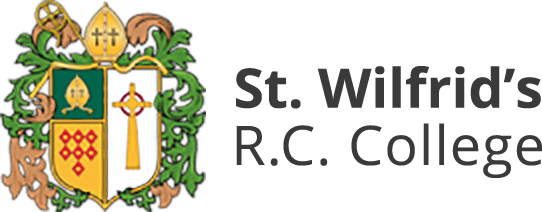“If you don’t know history, then you don’t know anything. You are a leaf that doesn’t know it is part of a tree.”
– Michael Crichton, Writer
The study of history is absolutely fundamental to our understanding of who we are, and why we are the way we are. At St Wilfrid’s, students develop a rich and diverse knowledge and understanding of the past and how it has shaped present day society, in relation to British and world history. Our students also learn about the historical significance of South Tyneside and how the area has changed over the past 1000 years. Not only do our students develop a deep understanding of the past, but they also learn how to think critically about the past as historians, by sifting arguments and weighing evidence to reach well-informed judgements. Gospel values underpin the history curriculum by developing students’ understanding of the past through a spiritual, moral and cultural lens.
What we study
In history at St Wilfrid’s, students learn about British history and its place in a wider world context from the Anglo Saxon era to the present day, building upon their understanding of ancient civilisations from Key Stage 2. Students also study significant aspects of the wider world such as the early Islamic world and the African Kingdom of Benin in Key Stage 3, Weimar and Nazi Germany and the Cold War in Key Stage 4, and Communist Russia in Key Stage 5. Students also learn about the local history of South Tyneside and North East England in relation to the wider context of British history, threaded throughout the curriculum.
Our curriculum is carefully sequenced to build upon students’ learning from Key Stage 2, and ensure that all students, including those with SEND and disadvantaged student, are challenged appropriately. Students learn about the past chronologically from Year 7 where they study Anglo Saxon Britain, through to Year 9 where they study the Cold War up until 1991. This helps students to develop a sound chronological understanding of the narrative of British, world and local history. Students learn how the world has changed through the lenses of power, beliefs, ideas, society, empire, conflict and the economy. This continues into Key Stage 4 and 5. Additionally, students learn to develop their historical skills in Key Stage 3, which are further honed in Key Stage 4 and 5 as they come across more complex themes, sources and interpretations.
In Key Stage 4, students begin their studies with a breadth study of Medicine in Britain from c1250-present, helping them to draw upon their broad chronological understanding from Key Stage 3. This then follows chronologically from Medicine in the First World War, through to Weimar and Nazi Germany and then Superpower Relations and the Cold War. In Year 11 students study Early Elizabethan England which allows them to return back to themes studied in the Medicine topic. Finally, students return to the Tudors in Key Stage 5 where they study broad themes of politics, society, economy, foreign policy and religion throughout the Tudor period, building upon their learning in Key Stage 4. Additionally, they return to the origin of Communist Russia, building upon their knowledge of the Cold War.
Learning outside of the classroom
All students are provided with homework to extend and consolidate their learning. At Key Stage 3 this involves retrieval activities, academic reading, and research activities. At Key Stage 4 this involves retrieval activities, reading and practice exam questions. At Key Stage 5 students complete flipped learning, retrieval activities and exam practice questions. Students at this level are also expected to complete independent study using extra readings provided by the school. We also believe strongly in giving students the opportunity to widen their learning by visiting museums and other historical destinations outside of the classroom.
Curriculum Intention:
- To help students develop a rich knowledge and understanding of the history of Britain and the wider world, as a coherent, chronological narrative from the Anglo Saxon period to the present day.
- To provide a continuous progression model from Key Stage 2 through to Key Stage 5.
- To develop students spiritually, morally, socially and culturally through studying a diverse history of Britain, and how it has shaped, and been shaped by, the wider world. British Values and Citizenship are threaded throughout the curriculum as students study the development of democracy and dictatorships.
- To develop students understanding of historical concepts such as change and continuity, cause and consequence, similarity and difference and significance, and use them to make connections, draw contrasts, analyse trends, frame historically-valid questions and create their own structured accounts and narratives.
- To help students understand the methods of historical enquiry, including how evidence us used to make claims about the past.
- To support students develop reading and writing skills by supporting all students in reading academic and historical texts, and learning to write like historians.
- To inspire a life long interest in history for all learners, by providing a stimulating curriculum in the classroom and educational enrichment opportunities outside of the classroom.
BCCET EYFS to KS2 History Curriculum Narrative
BCCET EYFS to KS2 History Overview
Knowledge Organisers
Year 7:
Year 8:
Year 9:
Year 10:
Year 11:


